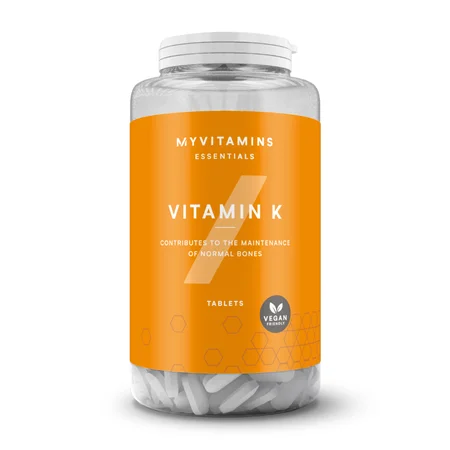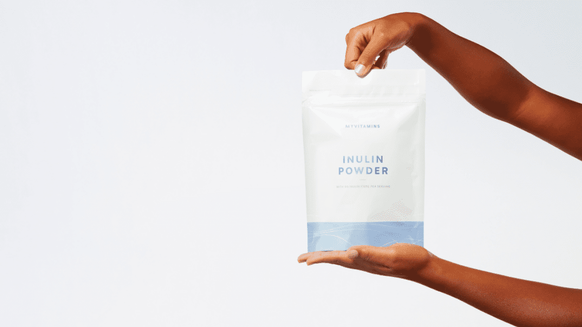What Is Vitamin K: Benefits, Side Effects & More

Vitamin K is a fat-soluble vitamin that plays a critical role in blood clotting, bone health, and heart health. In this blog post, we'll explore the benefits, side effects, and sources of vitamin K to help you understand its importance in maintaining overall health.
- What Is Vitamin K?
- Vitamin K Benefits
- How Much Vitamin K Do We Need?
- Vitamin K Side Effects
- How To Take Vitamin K Supplements
- Vitamin K Food Sources
- Talk To Your Doctor
- Take Home Message
- FAQs
What Is Vitamin K?
Vitamin K is a group of essential, fat-soluble vitamins that are essential for proper blood clotting and bone health. It is also important for cardiovascular function.
The two main forms of vitamin K are K1 (phylloquinone) and K2 (menaquinone). K1 is found in plant-based foods such as leafy greens, while K2 is produced by bacteria in the gut and is also found in animal products.
Vitamin K Benefits
Vitamin K, as an essential nutrient, provides several vital benefits to the human body. Research into vitamin K suggests further, lesser known functions. Here are the top benefits of vitamin K:
Normal blood clotting
Vitamin K is essential for blood clotting. It activates proteins that help the blood to clot, preventing excessive bleeding after an injury. Vitamin K deficiency can lead to an increased risk of bleeding disorders, such as bruising and bleeding gums (1)
Healthy bones
Vitamin K is also important for bone health. It activates proteins that help to mineralize bones, making them stronger and less likely to break. Studies have shown that people with higher vitamin K intake have a lower risk of fractures (2).
A healthy cardiovascular system
Vitamin K may also play a role in cardiovascular health. It has been shown to reduce the buildup of calcium in arteries, which can lead to heart disease. One study found that people with a higher intake of vitamin K2 had a lower risk of coronary heart disease (3).
Improved cognitive health
There is some evidence to suggest that vitamin K may also have a role in brain health. One study found that people with a higher intake of vitamin K had better verbal episodic memory, which is the ability to remember specific events or experiences (4).
Energy production
Vitamin K also helps facilitate energy production in the mitochondria of cells by increasing ATP production. One piece of research found an increase in cardiac output of 12% during exercise, following supplementation with vitamin K2 (5).
How Much Vitamin K Do We Need?
The amount of vitamin K an individual needs varies depending on age and gender. Most people can obtain enough vitamin K from the diet alone.
In infants between 0 and 6 months, 2µg per day is recommended. This increases to 2.5µg daily between the ages of 7 and 12 months. For children, the requirement sharply increases to 30µg per day between the ages of 1 and 3 years old. Between 4 and 8 years, 55µg is recommended, increasing to 60µg for those aged 9-13.
In adolescence, between the ages of 14 and 18, girls need 75µg per day and boys need 90µg. After the age of 19 years, the requirement rises to 90µg per day for women, and 120µg per day for men. Vitamin K dosage does not change for those pregnant or breastfeeding.
Vitamin K Side Effects
Supplementing with vitamin K can help to ensure you are maintaining adequate levels of this nutrient in the body. It can help reduce the risk of nutritional shortfall, and the symptoms of deficiency that may arise.
However, there are some potential side effects to taking vitamin K supplements:
Interactions with blood thinning medications
Vitamin K can interfere with the effectiveness of blood-thinning medications such as warfarin. If you are taking these medications, you should talk to your doctor before taking vitamin K supplements.
Diarrhoea
High doses of vitamin K can cause stomach upset, and symptoms such as gas, bloating, and diarrhoea.
Nausea and vomiting
Stomach irritation due to vitamin K toxicity may also lead to feelings of nausea and vomiting.
Allergic reactions
Some people may be allergic to vitamin K supplements, which can cause symptoms such as rash, itching, and difficulty breathing.
Interference with other medications
Vitamin K supplements can interfere with the absorption and effectiveness of certain medications, including antibiotics and medications used to reduce cholesterol levels.
How To Take Vitamin K Supplements
For adult women, 90µg of vitamin D is recommended. In men, this increases to 120µg per day. As vitamin K is a fat-soluble vitamin, it’s best to eat vitamin K-containing foods, or take your vitamin K supplement, with a source of fat. This helps to improve absorption. Some healthy fat sources to try include extra virgin olive oil, avocado, nuts and seeds.
Antibiotics may impede absorption of vitamin K, so individuals taking antibiotics long-term may be at heightened risk of deficiency. Supplementation may reduce this risk. However, it is recommended to seek medical advice before supplementing with vitamin K.
The Myvitamins Vitamin K Tablets contain 100µg of vitamin K to ensure you are meeting your recommended daily intake in a safe and convenient way.
Vitamin K Food Sources
Vitamin K1 is generally found in plant-based foods, whereas vitamin K2 is found more commonly in animal-based foods. It is also produced in the gut.
Some good sources of vitamin K include:
- Spinach
- Kale
- Broccoli
- Brussels sprouts
- Cabbage
- Lettuce
- Rapeseed oil
- Natto (fermented soybeans)
- Egg yolks
- Cheese
Talk To Your Doctor
Myvitamins are not making any medical claims in this article. If you are considering vitamin K supplementation, or are concerned about your intake, talk to your GP.
Take Home Message
Vitamin K is an essential, fat-soluble vitamin, known for its functions in blood clotting, maintaining healthy bones, and supporting the cardiovascular system. Most people can obtain adequate amounts of vitamin K from the diet alone, however, supplementation may reduce risk of nutritional shortfall. To reduce risk of side effects and ensure safe supplementation, it is recommended to speak to your GP before implementing a vitamin K supplement into your wellness routine.
FAQs
What does vitamin K do?
Vitamin K is an essential vitamin and is involved in critical processes within the body, such as blood clotting, cardiovascular health, and bone health.
What are the benefits of vitamin K?
The main benefits of vitamin K include contributing to normal blood clotting and the maintenance of normal, healthy bones. It also helps promote a healthy cardiovascular system, and some research suggests it may support cognitive function. It is also involved in energy production.
What foods are high in vitamin K?
The best sources of vitamin K1 are leafy greens, such as spinach, kale and broccoli. Natto (fermented soybeans) also provides vitamin K2, as do animal products such as egg yolks and cheese.









